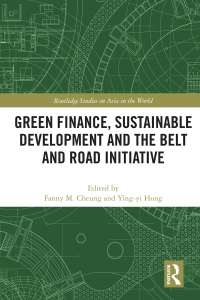Buy Green Finance, Sustainable Development and the Belt and Road Initiative 1st Edition PDF ebook by author Fanny M Cheung; Ying-Yi Hong – published by Routledge in 2021 and save up to 80% compared to the print version of this textbook. With PDF version of this textbook, not only save you money, you can also highlight, add text, underline add post-it notes, bookmarks to pages, instantly search for the major terms or chapter titles, etc.
You can search our site for other versions of the Green Finance, Sustainable Development and the Belt and Road Initiative 1st Edition PDF ebook. You can also search for others PDF ebooks from publisher Routledge, as well as from your favorite authors. We have thousands of online textbooks and course materials (mostly in PDF) that you can download immediately after purchase.
Note: e-textBooks do not come with access codes, CDs/DVDs, workbooks, and other supplemental items.
eBook Details:
Full title: Green Finance, Sustainable Development and the Belt and Road Initiative 1st Edition
Edition: 1st
Copyright year: 2021
Publisher: Routledge
Author: Fanny M Cheung; Ying-Yi Hong
ISBN: 9780367898809
Format: PDF
Description of Green Finance, Sustainable Development and the Belt and Road Initiative 1st Edition:
Can China’s Belt and Road Initiative (BRI) promote sustainable development, alongside its primary aims of increasing commercial connectivity with China’s partners? In discussions of the BRI the focus has tended to be on the implications for infrastructure construction, connectivity, and economic diplomacy. Rather less attention has been paid to its potential impact on sustainability. The initiative has not only set principles to prevent climate change and promote sustainable development, but also pledged to align with the UN’s environmental objectives. The contributors to this volume describe and evaluate the consequent policy coordination in the areas of green finance, green energy, and sustainable development in the Belt and Road regions. They examine both the challenges and opportunities of these projects, and the role that Hong Kong can play in supporting their assessment, finance, and implementation. With contributions from authors based in mainland China, Hong Kong, Australia, Qatar, the UK, and the US – with experience in corporate social responsibility, international finance, environmental policy, and international relations – this book presents a thorough and rigorous analysis of the green side of the BRI. A valuable resource for scholars of the BRI and its many implications for China, its partners, and the development of sustainable infrastructure.





